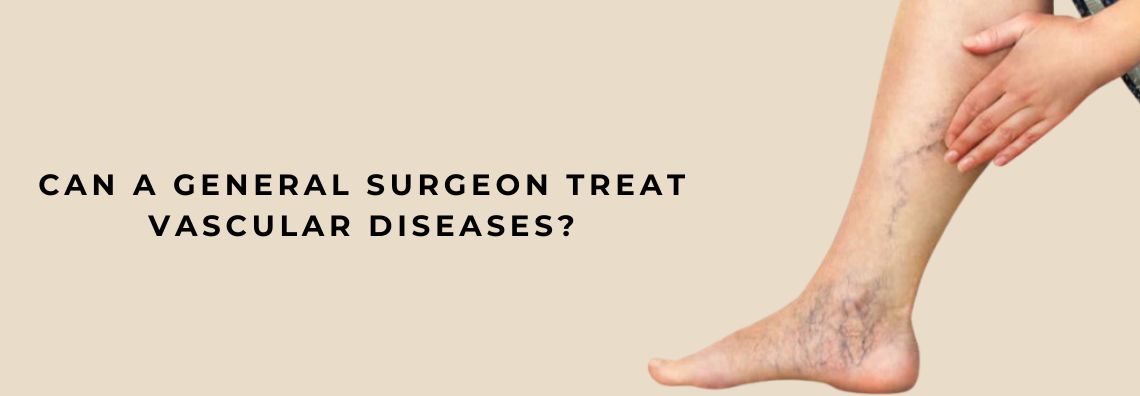
Vascular diseases, which affect the arteries, veins, and lymphatic system, often require specialized care. These conditions can range from simple problems such as varicose veins to serious ones such as aneurysm and deep vein thrombosis or DVT. Patients often wonder whether a general surgeon is capable of treating these diseases or if they need a vascular specialist.
Well, in short, a general surgeon can treat some vascular diseases, especially in emergencies or mild cases, but complex conditions usually require a vascular specialist. Now, let’s explore the role of a general surgeon in treating vascular diseases and when a patient should see a specialist.
What Are Vascular Diseases?
Vascular diseases affect the circulatory structure of the body; there are three main types, which include the arteries, veins, and capillaries, that carry blood all over the body. Such conditions can be potentially fatal, such as an aneurysm – the ballooning of an artery that could rupture or more chronically disabling, such as peripheral artery disease (PAD), in which the arteries become narrowed and diminished flow to the limbs. Other common vascular issues include venous insufficiency, varicose veins, and DVT. These conditions, when not treated in time, may lead to complicated issues such as heart attacks, strokes, and even amputation.
Because vascular diseases are so diverse and severe, cases like this require accurate, often specialized treatment. This raises the question—whether cases like these are the responsibility of a general surgeon or a vascular surgeon who specializes in the vascular system.
General Surgeon’s Role
A general surgeon is trained to perform surgeries across multiple systems of the body. Their speciality covers different aspects of the body including the digestive system, the soft tissues, the skin and more. Individuals usually visit them to cure problems such as appendicitis, hernias and injuries from trauma. General surgeons are well-equipped to address nearly any medical issue that requires surgery. However, their role is more vague about the vasculature.
General surgeons can certainly manage many vascular disease states, especially in emergencies. For instance, if someone sustains damage to their blood vessels or experiences a ruptured aneurysm, a general surgeon may be called upon to stabilize the patient and quickly perform emergency surgery to control the situation. For chronic or more complex vascular disease, though, the level of expertise required often exceeds that of a general surgeon’s general training.
The Emergence of Vascular Surgery as a Specialty
Vascular surgery has developed as a distinct speciality over time and may reflect the complexity of disease diagnosis and treatment. A vascular surgeon undergoes extra education following general surgery on diseases of the vascular system. Other than surgery, vascular surgeons not only provide surgical treatment but also non-surgical treatment, making them experts in managing conditions like PAD, venous insufficiency, and aneurysms.
The most significant difference between a general surgeon and a vascular surgeon is the use of endovascular techniques—treatments where the surgical procedure only requires very small incisions and can address vascular diseases. Techniques such as angioplasty and stenting involve opening the blocked arteries or repairing the damaged blood vessels with catheters. Such treatments with endovascular techniques usually lead to faster recovery, lower risk, and fewer complications as compared to open surgery.
When a General Surgeon Can Treat Vascular Diseases
General surgeons sometimes treat vascular diseases when the situation is urgent or simple. For example, in emergencies like traumatic vascular injuries or ruptured aneurysms, a general surgeon can perform life-saving surgery. They may also handle mild cases like superficial varicose veins or provide basic care, such as preparing patients for dialysis.
When to See a Vascular Surgeon
Most vascular conditions, especially chronic ones like PAD, DVT, or venous insufficiency, require a vascular surgeon’s expertise for specialized treatments such as non-surgical options or minimally invasive procedures. If you have leg pain when walking, swelling, slow-healing wounds, or discolouration, it’s important to see a vascular surgeon, as these may be signs of serious conditions needing advanced care like angioplasty or surgery. Vascular surgeons also help manage these diseases long-term with lifestyle guidance and medication.
Conclusion
General surgeons are able to effectively manage various medical conditions; however, vascular conditions necessitate specialized knowledge and techniques. General surgeons, for instance, can manage some vascular diseases, especially in emergencies and where specialized care is either unavailable or not reached. For more complex or chronic vascular diseases, it’s still best to see a vascular surgeon. Vascular surgeons have expertise in the circulatory system, advanced surgery, and nonsurgical techniques to provide patients with the most effective care for their specific conditions.